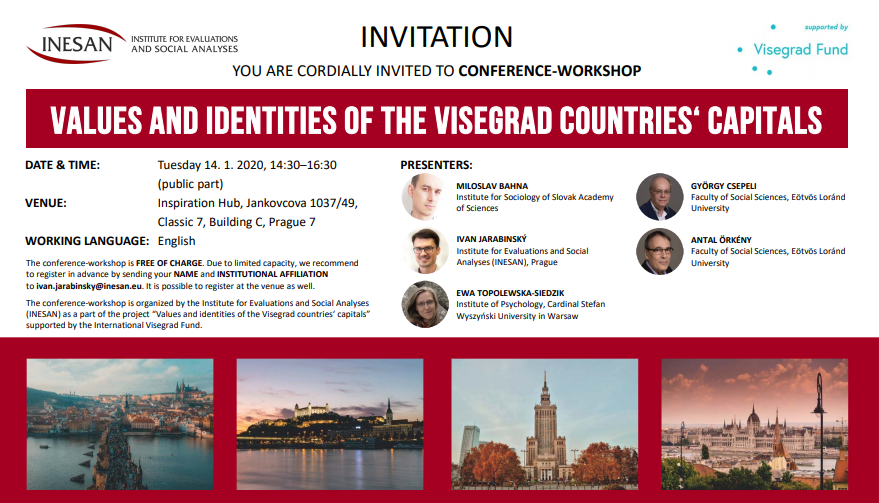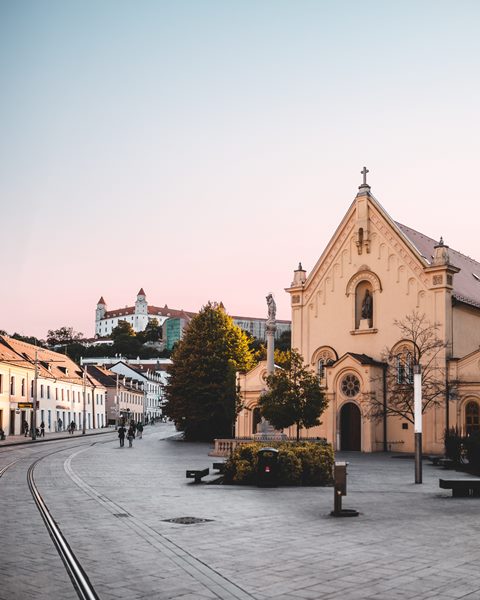Values and identities of the Visegrad countries’ capitals

The project is co-financed by the Governments of Czechia, Hungary, Poland and Slovakia through Visegrad Grants grants from the International Visegrad Fund. The mission of the fund is to advance ideas for sustainable regional cooperation in Central Europe.
Events and outcomes
Research summary
27. 3. 2020
Values and identities have recently been among frequently discussed and researched topics recently. To a large extent this is a reaction to social and economic changes which are happening on a both the local and global levels. The project, Values and Identities identities of the Visegrad countries’ capitals, is a part of such research initiatives. It was run initiated with the support of the International Visegrad Fund; and the research team involves researchers from Czechia (INESAN – Institute for Evaluations and Social Analyses), Slovakia (Institute for Sociology, Slovak Academy of Sciences), Hungary (Faculty of Social Sciences, Eötvös Loránd University) and Poland (Faculty of Christian Philosophy, Cardinal Stefan Wyszyński University in Warsaw). The main motivation of the research was based on the knowledge that the capitals indicate different behaviour and attitudes by its inhabitants in various spheres. The differences are most obvious, among other things, in the sphere of electoral behaviour.
- Bratislava
- Warsaw
- Budapest
- Prague
The research of the Values and identities of the Visegrad countries’ capitals was based on mixed method research using both international survey data and qualitative data. Focus groups were held in all of the four capitals, i.e. Prague, Bratislava, Budapest and Warsaw. The first focus group consisted of the capitals’ municipal representatives, in the second focus group experts were represented from various fields of social life. The focus group scenarios were the same for all focus groups in all of the four capitals to make the results comparable. The focus groups were also held in the same period, during the autumn of 2019. The focus were questions of the relationship to the capital, its importance for the formation of national identity, values of inhabitants, overall social atmosphere, and its openness.
In general, focus group participants presented their relationship to the capital as very positive. The relationship to the city was often expressed in strongly emotional terms. The perception of the capital is, to a large extent, influenced by its uniqueness. In the case of Budapest, the relationship to the city was presented the most heterogeneously – from the very close relationship and the feeling that “I would be nobody abroad” to the saying that “in a certain sense you can feel just as at home in Zagreb or Bratislava”[KN1] . Prague was often mentioned in line with its labels such as the ‘Mother of the cities’, ‘Rome of the North’, and the ‘Heart of Europe’. In the case of Budapest, the metaphorical similes used were Europe’s Cuba, and a mix of Mediterranean, Balkan and Western European lifestyles. Although an overall positive relationship to the city was presented, a sort of reservation was present in Warsaw and Bratislava. It was also possible to trace the role of the capital in building national identity. In the case of Warsaw, respondents emphasized its diversity as the diversity of its perception among inhabitants. Bratislava focus group participants pointed to the fact that, compared to the other capitals, Bratislava does not represent a historically natural national centre and its identity is weakly anchored due to its multicultural evolution. Warsaw, as a national symbol, is not directly connected to the city itself but rather to some buildings, such as the National Stadium or the Palace of Culture and Science. In the case of Prague and Budapest, both cities are substantially linked to the national identity and serve as the respective symbols. For instance, the most famous historical events in Budapest were connected to important political milestones of the Hungarian nation, for example, the revolution in 1956, the regime changes in 1989, and also the ‘golden age’ of 1867–1918, as was identified by the focus group participants. In Budapest and Prague, a geographical division is present, linked to strong local patriotism. In Budapest, the evident cleavage follows the line Buda–Pest, which is manifested in local politics, according to focus group participants. In Prague, there are more geographical demarcation lines, such as the Vltava river, individual districts in the sense of cadastral rather than municipal districts, or the historical city centre.
One part of the focus groups was connected to the atmosphere, or rather people’s perception of optimism and pessimism. All four capitals are, despite many maladies, perceived as very dynamic, providing many opportunities, and cities of successful people (Bratislava). Nevertheless, it is paradoxical, to a certain extent, that the perception of the atmosphere in the cities ranges from being rather pessimistic (it is in Slovak and Hungarian blood), via a mixture of optimism and pessimism (Warsaw) to rather optimistic with many ‘buts’ (Prague). Answers connected to the values of openness and conservatism were especially interesting in the four capitals. When comparing the capitals with the rest of the four countries, the values and opinions of the people were generally perceived to be rather open, individualistic and more tolerant. However, there were differences between the four capitals (e.g. “if the Bratislavan liberals – as we all say the ‘coffee shop liberals’ or non-liberals – went to Prague, half of them would still be quite conservative compared to what’s going on there”) and even more compared to other western countries, so the strength of the values is relative in many ways. Probably the most critical, in this sense, were the representatives of the local political elites in the Budapest focus group, where some of them referred to inhabitants of Budapest as not being innovative and even backward.
Understanding what we and our close neighbours have in common is very important for mutual understanding and, in the case of problems, not reaching for simplified solutions. This research confirmed that we still have a lot in common and our mutually-connected histories affect us more than we think, even today.
Ivan Jarabinský (INESAN), Magdalena Piscová and Miloslav Bahna (Institute for Sociology, SAS)
Capitals’ values and identities – video production
- 4. 2020
In cooperation with our project partners and Donath Business & Media, we are happy to publish our new video summarizing basic findings of the project.
Watch this video here:
Workshop on values and identities in central European capitals (14th January 2020, Prague)
Join us at the international conference on “Values and identities of the Visegrad countries’ capitals” hosted by the Institute for evaluations Evaluations and social Social analyses Analyses (INESAN) and supported by the International Visegrad Fund.
The international team of researchers from Prague, Warsaw, Bratislava and Budapest will present youthe early results of the common project focused on values and identities of the four capitals.
The conference-workshop is FREE OF CHARGE. Due to limited capacity, we recommend to registering in advance by sending your NAME and INSTITUTIONAL AFFILIATION to ivan.jarabinsky@inesan.eu. It is possible to register at the venue as well.
Conference INVITATION

Series of Articles
Jarabinský, Ivan. 2021. Do Praguers differ from Czechs? Selected topics of recent intergroup antagonism attempts. Journal of Nationalism, Memory & Language Politics, 15(2). Available at: https://doi.org/10.2478/jnmlp-2021-0010
Topolewska-Siedzik, Ewa and Cieciuch, Jan. 2020. Kołowy Model Sposobów Kształtowania się Tożsamości: założenia teoretyczne i empiryczna weryfikacja, Psychologia Rozwojowa, 25(3), pp. 13-32. Available at: https://www.ejournals.eu/Psychologia-Rozwojowa/2020/Numer-3-2020/art/18402/
Csepeli, György, Örkény, Antal and Zsigó, T. Ferenc. 2020. Közép-Európai fővárosok mentális térképei. In: A.Gergely, András; Kapitány, Ágnes; Kapitány, Gábor; Kovács, Éva; Paksi, Veronika (ed.). Kultúra, közösség és társadalom. Budapest: Társadalomtudományi Kutatóközpont; Magyar Szociológiai Társaság, pp. 56-74. Available at: https://szociologia.tk.hu/uploads/files/2020/5_CsepeliGy_OrkenyA_ZsigoT.pdf
About project

Workshop 2020
The project focuses on values and identities connected to the concept of a nation in the V4 capitals. Capitals are perceived as centres of national pride and, at the same time, they are multicultural environments where a diverse people community interacts daily. Voting behaviour in V4 capitals differs from the remaining populations where they vote significantly less for parties that use nationalist rhetoric. This indicates that the nationalistic rhetoric is not so as efficient in these places.
The goal of the project is to moderate the extreme use of national identity topics in public, both through accelerating discussion and public education. The project is based on the idea of the plurality of identity.
This project 1. updates knowledge of national identity and associated values (following the wave of African and Middle-Eastern immigration); 2. deepens knowledge of the formation and expression of national identities and values in the capitals; 3. based on the findings, provides information on how to deal with the public narratives and problems linked to national identity to moderate its extreme impacts.
Project coordinator
Ivan Jarabinský (INESAN)
ivan.jarabinsky@inesan.eu
Partners and research team
INESAN (Institute for Evaluations and Social Analyses)
Ivan Jarabinský is a Research Associate at the Institute for Evaluations and Social Analyses (INESAN) focusing on the topics of national and global identities. He runs an internal project on identities of the Czech population and he is the coordinator of the project Values and identities of the Visegrad countries’ capitals.
Eötvös Loránd University – Faculty of Social Sciences
Prof. Antal Örkény and prof. György Csepeli are among the most experienced scholars in Hungary, as well as in the region, concerning the topic of the project. They have written several books (e.g. with Székelyi “Grappling with National Identity. How Nations See Each Other in Central Europe”, or with Székelyi and Barna “A siker fénytörései” (Success in RegractionRefraction), etc.), in both English and Hungarian. They have also published more than a one hundred articles focusinged on national identity, minorities research, etc.
Cardinal Stefan Wyszyński University in Warsaw, Faculty of Christian Philosophy
Dr. Ewa Topolewska-Siedzik works on the topics of identities and their formation. She Her work publishes on these topics has been published in Poland and abroad in respected, high-quality journals. Her work on the circumplex of identity formation is worth mentioning. She is experienced with simile similar kinds of projects funded by the EU and she can also provide knowledge and contacts for some of the outcomes.
Institute for Sociology of the Slovak Academy of Sciences
Dr. Magdalena Piscová and dr. Miloslav Bahna are researchers from the leading institution in thefor research on national identities in Slovakia. They have worked as a team before and have been published publishing in work on topics connected to national identity and self-identification since the 1990s.“






